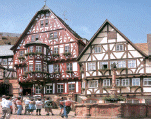|
Interesting
Facts
Geography
The
Federal Republic of Germany lies at the very heart of Europe and forms a
bridge between maritime Western Europe and Eastern Europe, between the
warm south and the cooler north. From the Alps in the south, the country
stretches north across wooded low mountain ranges as far as the North
Sea and the Baltic. From sandy ocean beaches and rolling pastures to
idyllic river valleys and dramatic mountain castles to bustling cities
and sophisticated spa resorts - Germany offers great variety in an area
the same size as the state of Montana, easily accessible and welcoming
all to visit. |
![[image]](facts_files/image001.jpg) |
|
Credit Cards
Major credit cards (Mastercard, Visa, American Express, Diners) are
commonly accepted, except at B & Bs and at some small restaurants and
individual retailers. Twenty-four-hour ATM terminals can be activated
with Plus System or Cirrus credit and banking cards.
Bank Hours
Banks are generally open from 8:30 AM to 1:00 PM and from 2:30 PM to
4:00 PM (Thursdays to 5:30 PM), Monday to Friday. They are closed
Saturdays, Sundays and on legal holidays.
Foreign Exchange
Exchange offices at airports and major border crossings are usually
open from 6:00 AM to 10:00 PM.
Time
Zone
Germany operates on Central European Time, which is six hours ahead of
Eastern Standard Time and nine hours ahead of Pacific Standard Time.
Electricity
Electricity runs on 220 volts, 50 cycles. An adapter plug and a
transformer may be used to operate such small appliances as hair dryers
and razors.
Shopping
Hours vary, with longer hours in major cities. Typically, stores are
open from 9:00 AM-6:30 PM Monday to Friday and to 4:00 PM on Saturday.
Stores are closed on Sundays and public holidays.
Measurements
Germany uses the metric system with:
• sizes in centimeters,
• distances in kilometers,
• weights in grams and kilograms.
• prices for food items in 100 grams or kilograms
Pharmacies
Open during regular shopping hours. Information about after-hour and
weekend service will be displayed on the entrance door or in the window.
Physicians
Office hours vary from physician to physician. Appointments are
generally required. In emergencies, call the Ärztlicher Notdienst
(Medical Emergency Service) listed in the telephone directory.
Emergencies
In case of an accident or other emergency, call the police on 110.
This number is toll-free from public phone booths. There are also
special emergency phone booths at stations, and on roads and
superhighways. In case of fire, call 112.
Museums
Generally closed on Mondays.
|
|
Postal Service
Post offices in larger cities are usually open from 8:00 AM to 6:00
PM, Monday to Friday, and until noon on Saturdays. Post offices at
airports and train stations often stay open longer, and some are open on
Sundays. Foreign money orders are paid out in German Marks.
Postage. International letters up to 20 g cost approximately DM 3,
postcards DM 2; domestic letters up to 20 g are DM 1.10, postcards DM 1.
Mailboxes are easy to spot by their bright yellow color. |
 |
|
Telephone Service
Local and long-distance phone calls can be made at any post office
or telephone booth. Most public phones are operated by telephone cards (Telefonkarten),
which can be purchased at any post office. The unit charge for
coin-operated public telephones is DM 0.30; however, increasingly fewer
phones accept coins. Although it is possible to call long-distance
directly from hotel rooms, it is substantially less expensive to call
collect or to use a public international phone booth.
• The country code from Germany to the US is 001 followed by the US area
code and local number. To make a call from Germany using your MCI call
card, dial 0130-0012. To use your AT&T calling card, dial 0130-0010.
• To call Germany from abroad, dial the international access code 49 for
Germany; the area code, dropping the first zero and the local number. To
call a German long-distance number in Germany, include the first zero
with the area code. When making a local call, omit the area code.
Tax-Free Shopping
The price of goods purchased in Germany includes a 16% value added tax
(VAT). However, you may be eligible to have some of this tax refunded.
Stores displaying a Tax Free for Tourists sign work with the Europe
Tax-Free Shopping Service. At the time of purchase, they issue a
Tax-Free Shopping Cheque. When leaving Germany, before checking your
luggage, present your purchased goods at the German Customs Office (at
all international airports and border crossings) and have the Tax-Free
Shopping Cheque stamped as your proof of legal export. You may then
obtain a cash refund at one of the Tax-Free Shopping Service counters
located in the international departure lounges of major airports as well
as in many train stations and some ferry terminals.
Public Holidays
• New Year's Day
• Epiphany (in Baden-Württemberg, Bavaria and
Saxony-Anhalt)
• Good Friday
• Easter Sunday and Monday
• Labor Day (May 1)
• Ascension Day
• Whitsunday and Monday
• Corpus Christi
• Day of German Unity (October 3)
• All Saints' Day (November 1)
• Christmas Day and Boxing Day |


![[image]](facts_files/image001.jpg)